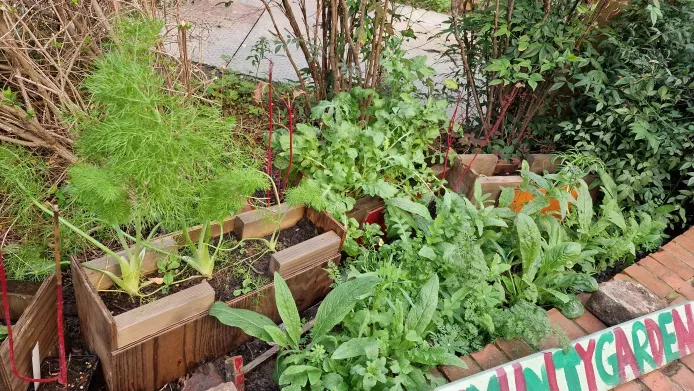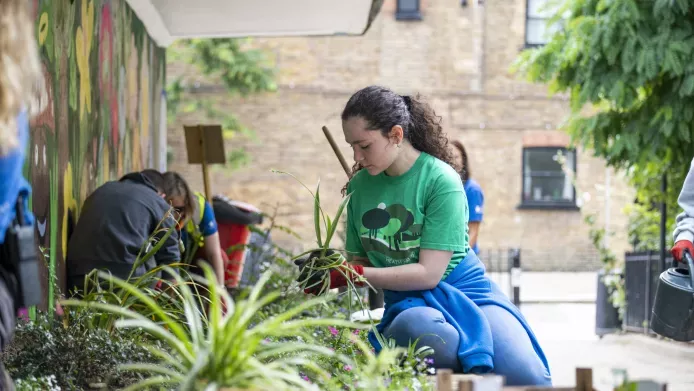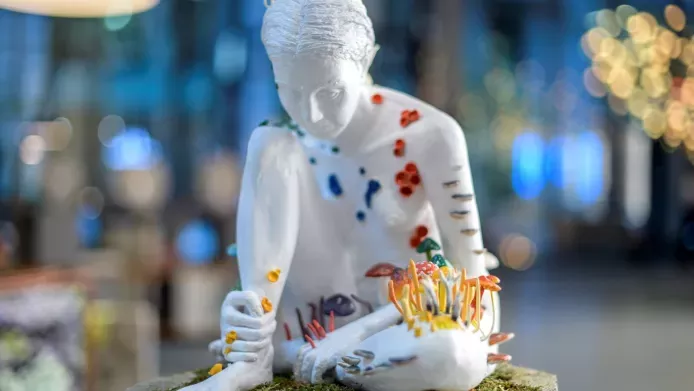Medical student Rahul talks about his 2022 youth project, which brought people together to grow wildflowers on his university campus, and his experience completing Kew’s Young Environmental Leader Award.
I've always loved gardening. I have a garden at home where I grew up, where I've carved out my little wildflower patch much to the decry of my parents. When I saw the Grow Wild opportunity on Instagram I thought, it won’t take much to do a two-minute application video. I never thought I'd get accepted, so I'm happy I did, and I thought, well, why not do it? Why not have a fun project? Something else other than medicine?
The initial plan was to make a wildflower patch at the back of the University campus (King's College London) growing troughs of pretty flowers, but troughs are more expensive than I realised. Instead, I went for fabric bags, wildflower soil, and seeds.
A lab technician who ran the community garden (Olly), along with several other people who work in the lab, took a lot of interest. Everyone was very active in ordering the parts and discussing what pots, seeds, water, etc. we needed, to make sure people feel shared ownership of the project.
 A campus staff member still has his wildflowers on his balcony at home.
A campus staff member still has his wildflowers on his balcony at home.
We then held an event in the garden for everyone on campus, where people planted their own pots of wildflowers. Some people took their pots home; a security guard who works on the campus still has his pot growing on his balcony. Once they had sprouted the next step was to clear a patch of disused raised beds to let the wildflowers grow and that's bloomed very nicely. There was Grow Wild funding leftover, meaning I could get additional bigger fabric pots to plant with more wildflowers, which have kept growing.
It was nice, bringing like-minded people together you never otherwise see in this huge campus hospital, creating a little community that cared.
The community appreciated the project; during the event people were making signs for growing vegetables and the flowers, doing this that and the other - everyone was taking part. It was nice, bringing like-minded people together you never otherwise see in this huge campus hospital, creating a little community that cared. There were a lot of students and some professors, but also a lot of people working in the hospital got involved. Another challenge was that the students were busy and often not good at going to things like this on their own. It can be hard to encourage them out of their shell, but we found them.

The project gave me a new perspective in terms of how difficult it is to make change in urban environments.
The project gave me a new perspective in terms of how difficult it is to make change in urban environments. The community garden belongs to the University and Estates Management, so I needed to communicate with many different departments to make change. At first, I was frustrated that I couldn’t plant all the areas of the garden with wildflowers because I didn’t have control over the area, but I realised it was a collaborative event and I'm very grateful that those running the campus garden worked with me to help me shape the space.
I think moving ahead, I will try and get involved to encourage a wildflower garden or something natural wherever I'm working, whatever environment I am in.
Our campus is in the middle of central London, next to London Bridge. We don't have the room to do big project, although I wish we did. This was our contribution, a little lay by for pollinators in the middle of the city. My home is near Epping Forest where there’s lots of greenery - coming from that to central London it was very nice having a patch where I knew there was something growing, something pretty, something green. That was a nice grounding.
The project also allowed me to do something other than my medical course and gave a nice breather from it. It may not directly help my medical career, but I think moving ahead, I will try and get involved to encourage a wildflower garden or something natural wherever I'm working, whatever environment I am in.

I would recommend everyone to do a Grow Wild Youth Project because it doesn't matter what field you're in, if you have a passion for nature, there's no point not to.
Managing the project alongside my medical degree was a limiting factor on how much I would have liked to get done. But I learned a lot in terms of how to manage my time and I now know what I can do to improve in future projects. I learned how to do some cool events, how to make them interactive, what worked and what didn't, which will all be good moving ahead. I also completed the Kew Young Environmental Leader’s Award (YELA) alongside the project which was a nice reflection tool to look back on what I achieved.
I would recommend everyone to do a Grow Wild Youth Project because it doesn't matter what field you're in, if you have a passion for nature, there's no point not to. My advice for anyone planning a project is:
- Make it manageable - don't try to over plan, choose two or three simple but effective things rather than one big plan.
- Budget well – don't buy the most expensive wildflower seeds and realise you can't afford anything else.
- Make a firm time management plan - make sure you're devoting enough of your time, otherwise you won't reach the benefits of the project.
- Try to engage people - I wish had used social media more to advertise. Engagement doesn't have to be related to your university or school, maybe there's someone else who loves gardening in the community to get involved. If you can find people that want to sustain the changes you made after the project is over, that'll create more of a lasting change.

Find out more about Youth Projects

Youth Grants

